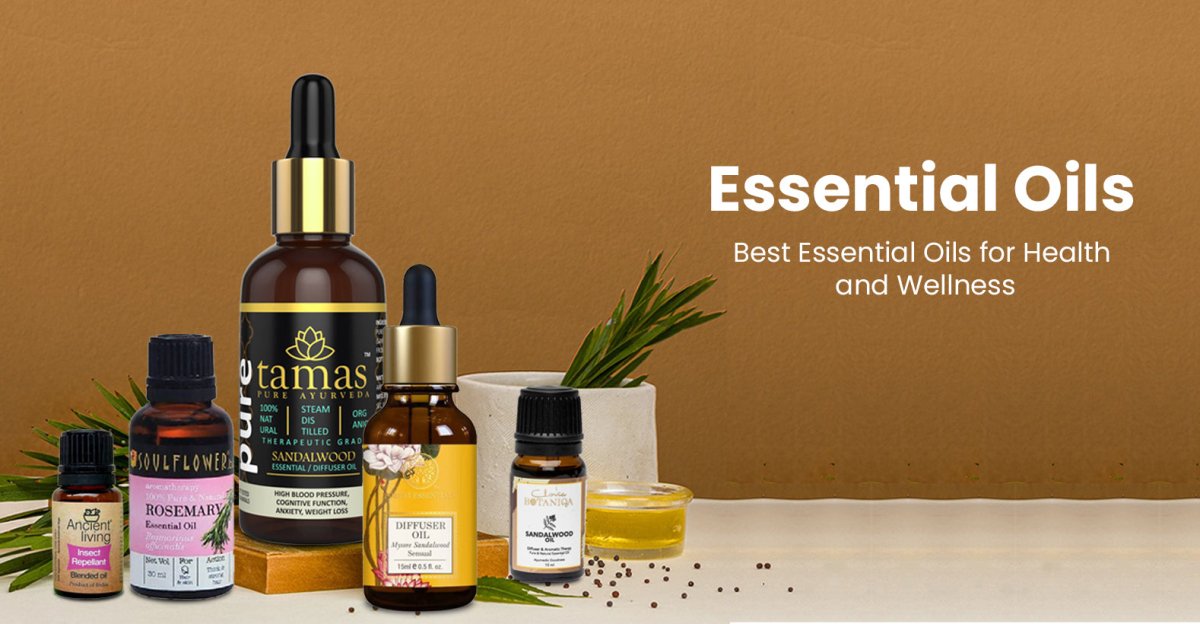What Are The Things You Should Know About Essential Oils?
What is the fascination with essential oils? And what are some of the applications for essential oils? Essential Oils are becoming increasingly popular as people learn about their effectiveness. They are less expensive, safer, and perform far better than most other solutions on the market. The essential oil movement is for you to solve a problem in your life or live a healthier and more natural lifestyle. Essential oils have a vast range of applications. You can use them to make your house smell amazing, to support your body's various systems, to clean your house, or to change your mood instantly.
What are Essential Oils?
Some of you must be familiar with the meaning of Essential Oils, and for people who are fresh to this trend, these essential oils are extremely appealing. Not to mention, some essential oils have been around for a long time, while others are only recently discovered. Essential oils for skin are liquid extracts of various plants that are extremely beneficial. Essential oils are plant-derived compounds, and the oils capture the true scent and flavour of the plant or its essence. Unmatched aromatic compounds give each essential oil its distinct aroma. The steam distillation method is used to create essential oils. Essential oils, which are derived from plants, have numerous advantages. Furthermore, they have many advantages and unique properties of the plants from which they are extracted.
Ingredients of Essential Oils:
The essential oil plant ingredients are
- Dandelion

- Burdock

- Rose

- Bergamot

- Sarsaparilla

- Spearmint

- Violet

- Lavender

- Paregoric
- Peppermint

Health Benefits of Essential Oils:
Essential oils play an important role in traditional and folk medicine all over the world. However, Essential oil Benefits in modern medicine back up many of the ancient claims made about them, such as:
-
Reducing Stress:
Aromatherapy employs a wide range of essential oils to alleviate stress and anxiety. Orange oil, for example, was found to have an anxiety-reducing effect on male volunteers who inhaled 2.5, 5, or 10 drops. More research is required, but preliminary findings are encouraging.
-
Yeast Infections:
Early tea tree oil research has yielded good antimicrobial properties, which have long been touted in traditional medicine. Athlete's feet, oral thrush, and fungal infections such as candida have all been treated with the oil.
-
Pain Relief:
Essential oils have been shown to help relieve pain in various ways, from minor to severe. A study in pain research and treatment looked into various potential applications, from postoperative and back pain and chronic neck to cancer and labour-related pain. And found that aromatherapy had a significant positive effect in reducing pain, especially when combined with traditional pain management approaches.
-
Sleeping Aid:
The relaxing fragrance of lavender oil will improve sleep quality. Scientists put this claim to the test on dementia patients over the age of 65. They discovered that sprinkling the essential oil on towels around their pillows increased their sleep time significantly, allowing them to sleep longer in the mornings.
-
Preventing Disease:
Antioxidant properties are found in many essential oils. Antioxidants are used to prevent cell damage caused by free radicals, and this damage has the power to cause serious diseases such as cancer. Researchers want to know how adding essential oils to food can increase our consumption of antioxidants while also extending shelf life.
-
Hair Health:
Essential oils are an excellent choice for hair care. Essential oils for hair growth can treat both greasy and dry hair, and it promotes improving blood circulation to the scalp. Lavender essential oil conditions the hair, keeps it shiny and helps to control dandruff.
-
Skin Nutrition:
Pure essential oils heal damaged skin and nourish it deeply. Tea tree oil and lavender have anti-inflammatory properties that can help reduce the irritation and inflammation caused by skin conditions like acne, eczema, burns, and insect bites. It reduces wrinkles and thus improves skin appearance.
-
Improve your Mood and Clean the Air:
Essential oils, when used aromatically, can improve your mood and purify the air. Certain oils have been shown to kill germs and bacteria in the air. Aromatherapy is the most common application of essential oils.
How to use essential oils on Skin and Body?
Essential oils are most frequently used in aromatherapy, which involves inhaling them through various methods. Essential oils should not be consumed. Essential oils' chemicals can interact with your body in a variety of ways. Some plant chemicals are absorbed when applied to the skin. Certain application methods, such as applying with heat or to different body areas, are thought to improve absorption. Inhaling essential oil aromas can stimulate your limbic system, a part of your brain that regulates emotions, sense of smell, behaviours and long-term memory.
What are the Properties of Essential Oil?

Pure Essential oils are widely used as flavouring agents in cosmetics, perfumes, cleaning products, home fragrances, and food. They are recognised to have antiseptic, bactericidal, decongestant, soothing, antispasmodic, and anti-inflammatory properties. They have been proven scientifically to have antioxidant, purifying, soothing, lightening, and anti-ageing properties for the skin. Essential oils for hair must always be used diluted and never in their entirety, and they are primarily diluted in vegetable oils or used as formulation bases.
How to use Essential Oil?
Manufacturers use essential oils to make a variety of products. Essential oils are used in the cosmetic and makeup industries to make perfumes, add fragrance to creams and body washes, and even natural antioxidant sources in some beauty care products. Essential oil uses are taken off by many natural medicine practitioners, including aromatherapists. These are the practices of diffusing essential oils into the air. Aromatherapy is used by anyone who has used a mentholated vapour rub to help clear their sinuses.
Essential Oils for Skin:
In addition to inhaling them, combining essential oils with other oil and massaging them into the skin may deliver active compounds to the body. Until under the direct supervision of a healthcare professional, people should never apply or try essential oils straight to their skin without first diluting them. It is also risky to consume essential oils. Not only are essential oils highly concentrated, but they can also irritate the body's sensitive cells. Some people may take essential oil capsules orally in rare cases. People should, however, only do so under the supervision of a healthcare professional. However, regular commercial aroma oils should not be used near the mouth or other places where they may enter the body, such as the anus, eyes, ear or vagina.
List of Essential Oils and Their Uses:
There are over 90 various types of essential oils, each with its distinct smell and use. Here are a few of them listed below.
Sandalwood:
Many fragrances and air fresheners contain sandalwood essential oil, and it has a characteristic aroma that comes from a valuable tree. The benefits of sandalwood oil are extended beyond its smell, and sandalwood may also provide some health advantages.
Lavender:
This Lavender Essential Oil extremely popular oil has numerous advantages. This subtle floral aroma might aid with relaxation and sleep.
Rosemary:
Rosemary Essential Oil is a flexible essential oil that may be used in various ways in everyday life, including encouraging good hair, generating a relaxing massage, cooking healthy meals, and more. It even helps to maintain a healthy digestive system.
Rose:
Rose Oil has been demonstrated to help alleviate anxiety when inhaled because of its sweet, floral aroma. Its antioxidant qualities have also been reported to aid in treating acne and improving complexion for a more youthful appearance.
Ylang ylang:
This flowery oil exposes a spicy but sweet scent and has been touted as a relaxing aid source, a self-esteem booster, and even a bug repellant Source.
Vetiver:
The woody, sweet scent of Vetiver Essential Oil is commonly used in soothing meditation to lift spirits and calm tensions. Because of its antioxidant properties, it supports improving skin health and restores scars.
Frankincense:
This Frankincense Essential Oil one has a perfume that smells like a holiday, but it also has digestive, antibacterial, astringent, and disinfectant properties.
Cedarwood:
Cedarwood Essential Oil is a unique woody scent that is utilized in a variety of topical beauty treatments. Furthermore, it is said to aid in the reduction of arthritis and the relief of coughing.
Peppermint:
This Peppermint Essential Oil has herbal aroma can help to ease IBS symptoms when inhaled. Similarly, this oil can aid with headaches and indigestion.
Spearmint:
Spearmint oil has a little sweeter aroma and has been discovered to have antifungal qualities. When applied, it gives the same cooling effect as peppermint, making it equally useful for warding off unwelcome insects and soothing bug bites.
Basil Oil:
Basil essential oil offers a wide range of external and interior uses. It has been demonstrated to be antibacterial and anti-inflammatory so that it could be used as a cold and flu treatment and a muscle relaxant.
Lemon:
This fruity Lemon Essential Oil is high in vitamins, which can aid with inflammation and anaemia. Boost energy levels and ease nausea with this trusted source.
Grapefruit:
It is made from the outer layer of citrus Grapefruit Oil, has a bitter and fresh perfume and is a popular diffuser oil. It possesses antifungal properties, which could help with the elimination of harmful germs.
Orange:
Orange oil is rich in vitamin C properties and provides numerous skin advantages when used outside. This oil can be used in a range of cosmetics and claims to make skin shine better, softer, and healthier.
Dosage of Essential Oil:
As you may be aware, essential oils are highly concentrated. If we are not mindful of the amount we use in our mixtures, we may have a negative aromatherapy experience. Here are a few examples of essential oil dosing for various cosmetic purposes:
- When using massage oil, you should combine 10 to 20 drops of essential oil with vegetable oil like sunflower or olive oil to make a massage oil.
- For an aromatherapy bath, add 3 to 15 drops of essential oil to a bath of warm water.
- For a private shower, add 3 to 5 drops in a 33oz. bottle
- 20 drops in a 4oz bottle of room freshener
- 1 to 3 drops of mouthwash per 1/4 glass of water
- Ten drops in 33oz of water for a hand or foot bath
It is best to combine your essential oil with base oil when making cosmetic products such as massage oils, hair and face masks, and moisturising lotions. Essential oils for skin care vitamin A, E, and F-rich vegetable oils, and they are an excellent cosmetic component because they soothe, nourish, and nurture your skin.
Essential Oil Accessories:
Diffusers:
Aromatherapy essential oils activate the brain's hypothalamus region and help you feel happier and calmer. As a result, aroma oil diffusers can be advantageous because they release various essential oils into the air. Each of these essential oils has a distinct scent and can help with a variety of health issues. Aroma oil diffusers create a lovely atmosphere in your house, with scents like lavender and citrus being particularly popular for their mood-lifting properties. As a consumer, you should see scent oil diffusers as a sensory enhancement to your space, similar to how eye-catching wall stickers provide a visual enhancement.
Glass water bottle:
You will want to avoid using plastic bottles if you are going to be consuming your essential oils. The best option is to use a glass water bottle.
Small jelly jars:
These are the ideal size to store all of your essential oil recipes. In small glass jars, rubs, scrubs, and lotions will look attractive.
Disclaimer: One must consult a health practitioner before consuming or using this product.










